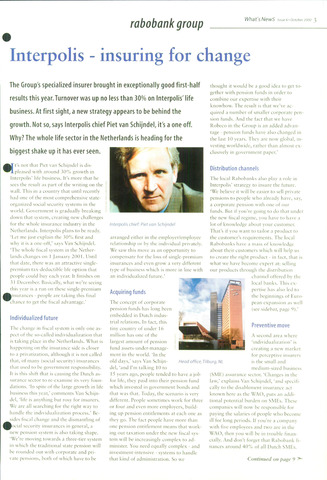Interpolis - insuring for change
rabobank group
W'
The Group's specialized insurer brought in exceptionally good first-half
results this year.Turnover was up no less than 30% on Interpolis' life
business. At first sight, a new strategy appears to be behind the
growth. Not so, says Interpolis chief Piet van Schijndel, it's a one off.
Why? The whole life sector in the Netherlands is heading for the
biggest shake up it has ever seen.
Individualized future
Acquiring funds
Distribution channels
Preventive move
What'sNewS Issue 6 October 2000
[t's not that Piet van Schijndel is dis-
pleased with around 30% growth in
Interpolis' life business. It's more that he
sees the result as part of the writing on the
wall. This in a country that until recently
had one of the most comprehensive state-
organized social security systems in the
world. Government is gradually breaking
down that system, creating new challenges
for the whole insurance industry in the
Netherlands. Interpolis plans to be ready.
'Let me just explain the 30% first and
why it is a one-off,' says Van Schijndel.
'The whole fiscal system in the Nether
lands changes on 1 January 2001. Until
that date, there was an attractive single
premium tax-deductible life option that
people could buy each year. It finishes on
31 December. Basically, what we're seeing
this year is a run on these single-premium
■insurances - people are taking this final
chance to get the fiscal advantage.'
The change in fiscal system is only one as
pect of the so-called individualization that
is taking place in the Netherlands. What is
happening on the insurance side is closer
to a privatization, although it is not called
that, of many (social security) insurances
that used to be government responsibility.
It is this shift that is causing the Dutch as-
surance sector to re-examine its very foun
dations. 'In spite of the large growth in life
business this year,' comments Van Schijn
del, 'life is anything but rosy for insurers.
We are all searching for the right way to
handle the individualization process.' Be-
sides fiscal change and the dismantling of
fcocial security insurances in general, a
new pension system is also taking shape.
'We're moving towards a three-tier system
in which the traditional state pension will
be rounded out with corporate and pri
vate pensions, both of which have to be
Interpolis chief: Piet van Schijndel
arranged either in the employer/employee
relationship or by the individual privately.
We saw this move as an opportunity to
compensate for the loss of single-premium
insurances and even grow a very different
type of business which is more in line with
an individualized future.'
The concept of corporate
pension funds has long been
entbedded in Dutch indus-
trial relations. In fact, this
tiny country of under 16
million has one of the
largest amount of pension
fund assets-under-manage-
ment in the world. 'In the
old days,' says Van Schijn
del, 'and I'm talking 10 to
15 years ago, people tended to have a job
for life, they paid into their pension fund
which invested in government honds and
that was that. Today, the scenario is very
different. People sometimes work for three
or four and even more employers, build
ing up pension entitlements at each one as
they go. The fact people have more than
one pension entitlement means that work-
ing out taxation under the new fiscal sys
tem will be increasingly complex to ad-
minister. You need equally complex - and
investment-intensive - systems to handle
that kind of administration. So we
thought it would be a good idea to get to-
gether with pension funds in order to
combine our expertise with their
knowhow. The result is that we've ac-
quired a number of smaller corporate pen
sion funds. And the fact that we have
Robeco in the Group is an added advan
tage - pension funds have also changed in
the last 10 years. They are now global, in-
vesting worldwide, rather than almost ex-
clusively in government paper.'
The local Rabobanks also play a role in
Interpolis' strategy to insure the future.
'We believe it will be easier to sell private
pensions to people who already have, say,
a corporate pension with one of our
funds. But if you're going to do that under
the new fiscal regime, you have to have a
lot of knowledge about your customer.
That's if you want to tailor a product to
the customer's requirements. The local
Rabobanks have a mass of knowledge
about their customers which will help us
to create the right product - in fact, that is
what we have become expert at: selling
our products through the distribution
channel offered by the
local banks. This ex
pertise has also led to
the beginnings of Euro-
pean expansion as well
(see sidebar, page 9).'
Head office, Tilburg, NL
A second area where
'individualization' is
creating a new market
for perceptive insurers
is the small and
medium-sized business
(SML) assurance sector. 'Changes in the
law,' explains Van Schijndel, 'and specifi-
cally to the disablement insurance act
known here as the WAO, puts an addi-
tional potential burden on SMEs. These
companies will now be responsible for
paying the salaries of people who become
ill for long periods. If you're a company
with five employees and two are in the
WAO, then you will be in trouble finan-
cially. And don't forget that Rabobank fi-
nances around 40% of all Dutch SMEs.
Continued on page 9

